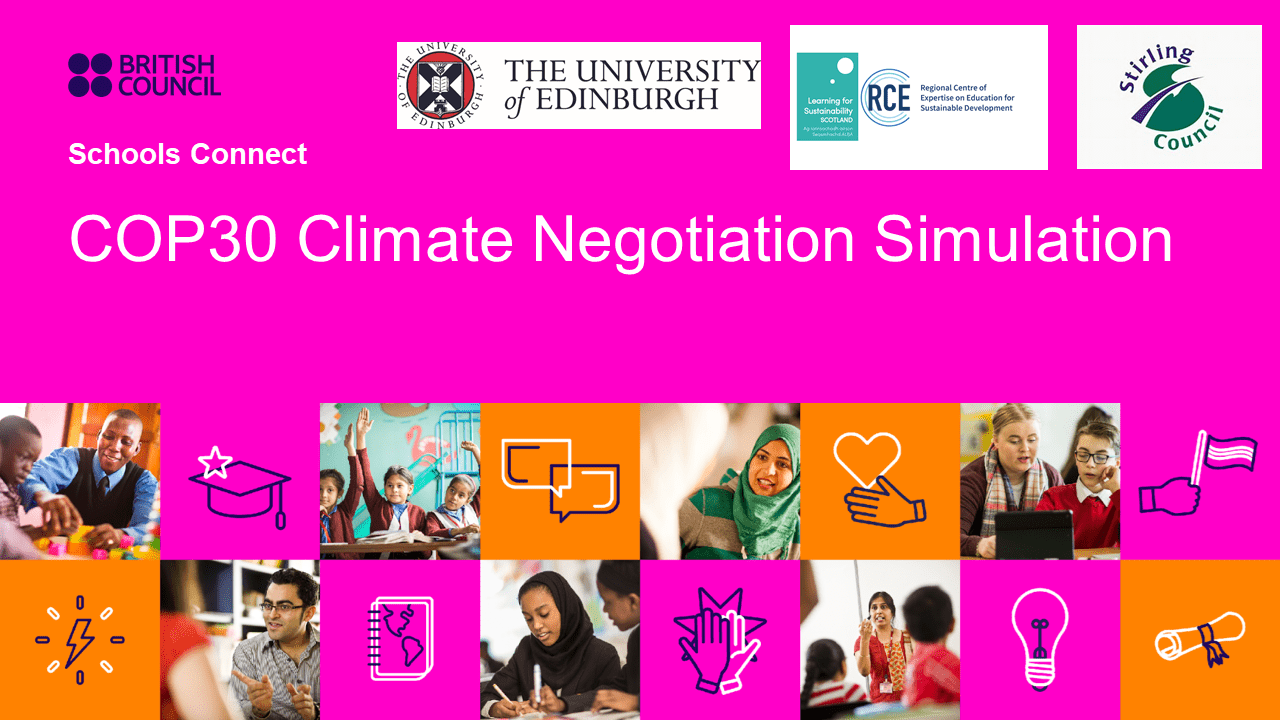31st October 2025
Scottish pupils lead climate crisis talks in COP30 negotiations

Nearly 200 pupils from 19 Scottish secondary schools transformed into world leaders, high-profile lobbyists, and international journalists at two events in Edinburgh and Stirling last week: engaging in high-stakes climate crisis negotiations to mirror the upcoming COP30 talks in Brazil.
This is the third year that these award-winning United Nations-style debate simulations have been organised by Learning for Sustainability Scotland in partnership with the British Council and the University of Edinburgh: enabling students in City of Edinburgh, West Lothian, and Scottish Borders to experience first-hand the complex challenges of international climate diplomacy. This year, we were delighted to also offer this opportunity to students from Stirling, Falkirk, and Renfrewshire through an additional event delivered in partnership with Stirling Council’s Youth Participation Team.
About the event
Using cutting-edge simulation software developed by MIT, the pupils took on roles as delegates from major nations, corporate lobbyists, climate activists, and international media representatives. Together, they worked to produce a global agreement to keep the global temperature from rising above 1.5 degrees above pre-industrial levels; as well as ensuring that the most vulnerable nations are provided for financially.
Leading the negotiations were pupils Alyssa Haston and Siri Isaksson-Galbraith; and Lieke van de Coterlet and Jeslin Konthuruthy who shared the role of the United Nations Secretariat General at the Edinburgh and Stirling events respectively.
Speaking in their role as UN Secretaries-General, they had a message for world leaders in Brazil:
“Today, we’ve experienced first-hand how difficult climate negotiations can be, but also how essential they are. We’ve learned that every country has different challenges, but that we all share the same planet and the same future.
“The decisions being made at COP30 will shape our lives, our communities, and our world. We urge world leaders to listen to youth voices, to act with urgency, and to remember that compromise doesn’t mean giving up on ambition. The climate crisis affects us all, but it doesn’t affect us equally. We must ensure that those most vulnerable are heard and supported. From Scotland to Brazil, young people are ready to lead, but we need action now.”
Did they reach a consensus?
The challenge was to negotiate between countries to keep warming under 2°C by the end of the century, and to aim for under 1.5°C. By the end of the debate, pupils collectively agreed to keep global warming at 1.6°C and 1.9°C respectively; just beyond the 1.5°C ambitions of the 2015 Paris Agreement. They may have exceeded this target, but they did make headway with strategies to reduce greenhouse gas emissions, support vulnerable nations, and develop adaptation measures to protect people and nature.
The Edinburgh event was led by Learning for Sustainability expert Professor Pete Higgins, former Chair in Outdoor, Environmental and Sustainability Education at University of Edinburgh.
Speaking at the event, Professor Higgins said:
“Today’s debate couldn’t be more timely. We’re living through a period of significant political uncertainty, which makes climate diplomacy more complex than ever. What impressed me most was how quickly these young people grasped the competing priorities and difficult trade-offs involved; whilst maintaining their determination to find common ground.
“Young people often feel powerless when it comes to climate change, but events like this show that they have both the understanding and the diplomatic skills to navigate these challenges. My hope is that the negotiators at COP30 will show the same wisdom and commitment to meaningful action that these young citizens have demonstrated today.”
Claire de Braekeleer, Director British Council Scotland added:
“This UN debate simulation puts young people in Scotland at the heart of the global climate debate. As COP30 starts in Belém next week, these pupils are gaining crucial insights into how these climate negotiations work. They are also building the diplomatic skills and understanding that will be vital for the international cooperation we desperately need.”
“We believe that young people are the key to driving positive climate action and today demonstrates how collaborating globally with empathy and understanding is the way forward.”
Next steps and further opportunities…
The simulations were part of the British Council’s Schools Connect programme, which aims to bring international perspectives into the curriculum. Students engaged in realistic debates, negotiated complex agreements, and balanced competing interests of nations both rich and poor.
Through its Climate Connection programme, the British Council is also supporting people globally to find creative solutions to climate change in support of COP30. British Council is supporting the summit by engaging with networks of education professionals, students, academics, researchers, artists, civil society leaders and policymakers to participate in meaningful dialogue and bring about real change for our planet.
Another key opportunity, starting on 10 November, is the ‘Live at COP30’ Massive Open Online Course (MOOC). This FREE learning experience, delivered in partnership by Learning for Sustainability Scotland, University of Edinburgh and British Council, offers you an opportunity to examine what the COP process is, why it’s considered to be important, and reflect on how you can add your voice to the call for collective action for a sustainable future. Since its first iteration in 2021 for COP26, over 20,000 people from over 170 countries have taken part in this collaborative, facilitated learning opportunity.